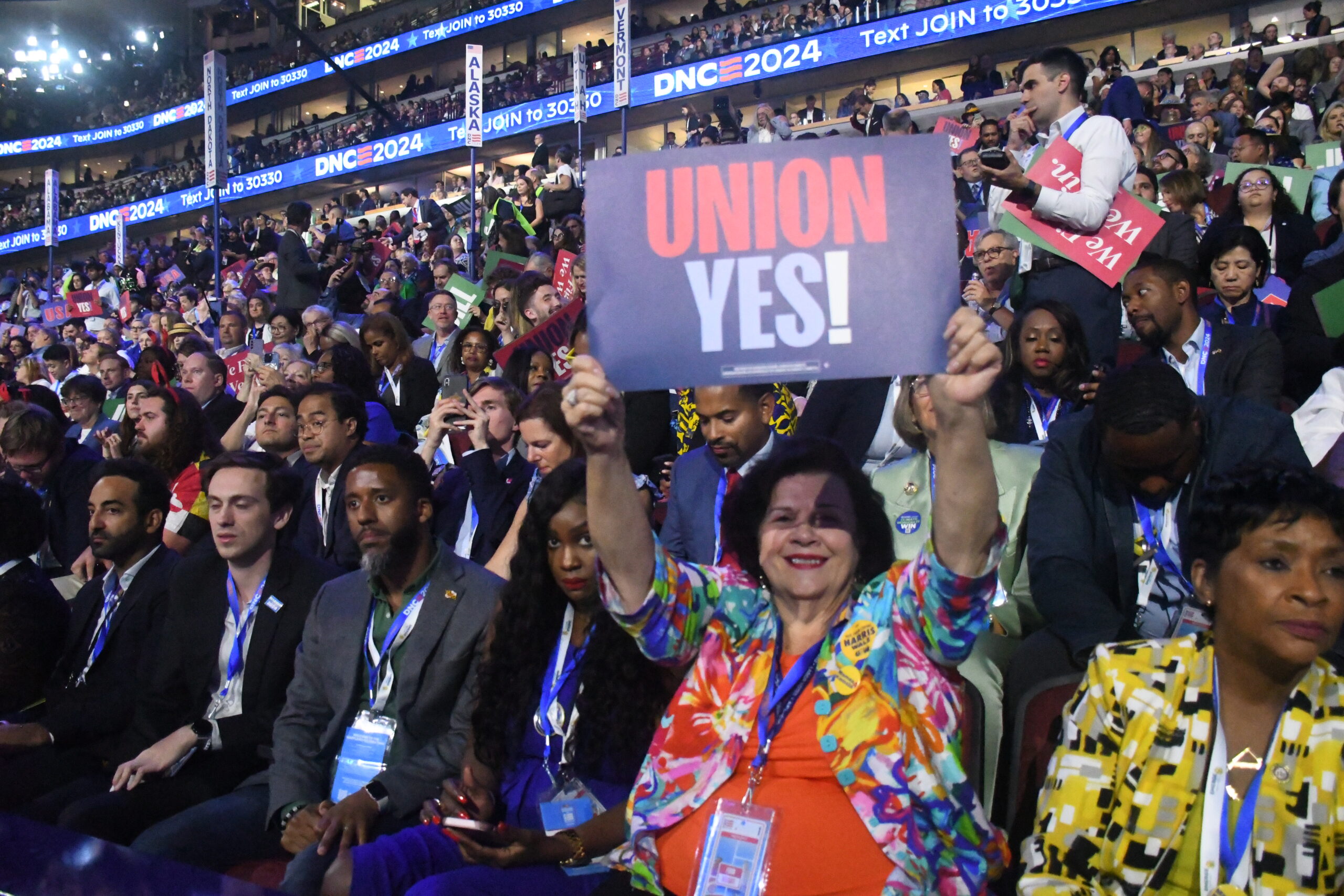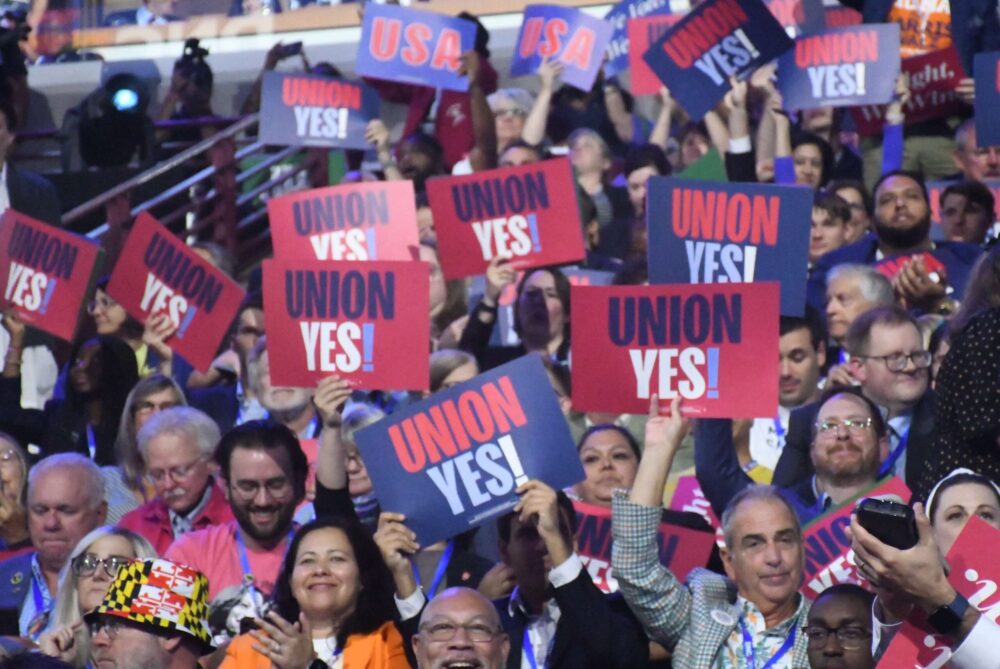WASHINGTON – When Darlene Butler-Jones, a 66 year-old shop steward for Giant, walks into a store, people listen.
Butler-Jones is part of a group of grocery store workers assigned by her union – United Food & Commercial Workers Union Local 400 – to explain the organization’s political endorsements to her fellow employees.
As she walks through the store, talking to employees at cash registers and counters, Butler-Jones hears their concerns about fair scheduling, retirement, and dignity in the workplace.
 “People want change,” Butler-Jones said.
“People want change,” Butler-Jones said.
As Democrats and Republicans argue over which party truly represents working people and who will secure their vote, Maryland union leaders say it’s not about party, it’s about policy.
Capital News Service spoke to six Maryland-based union presidents and political leaders to better understand how union endorsements work and the impact of unions on politics in Maryland.
What the unions, and their members, want
Maryland union leaders said they are focused on improving the lives of their members, which most said comes down to their ability to organize.
Donna S. Edwards is the president of the Maryland State and D.C. AFL-CIO, a federation of more than 50 unions.
To get union backing, Edwards said, politicians need to support the Protecting the Right to Organize Act, commonly known as the PRO-Act, and the Public Service Freedom to Negotiate Act, a bill to guarantee the right to organize for public sector employees.
The PRO-Act, a bill promoted by the labor movement, aims to protect the right to join and form a union by prohibiting common employer intimidation tactics and requiring employees represented by collective bargaining units to pay their fair share of representation fees.
This Congress, 263 Democrats, three Republicans and two independents sponsored the PRO-Act. The bill has not been put up for a vote in either chamber. The Public Service Freedom to Negotiate Act has seen no action.
To get an endorsement from the Maryland State and D.C. AFL-CIO, candidates must first fill out surveys detailing their stances on nearly every issue in some way related to labor. Then top candidates are interviewed by union members and leaders before a final selection is made.
The top three factors union officials making the AFL-CIO endorsements consider are the candidate’s views on issues, viability and voting record, according to Kayla Mock, the political and legislative director for the local food and commercial workers union, which falls under the state’s AFL-CIO.
Unions are focused on fundamental issues important to working people, like healthcare, child care, and the right to organize, Mock said. These issues, many union leaders say, typically favor Democratic candidates.
In the 2024 election, the Maryland State and D.C. AFL-CIO only endorsed Democratic candidates for Congress.
“I tell my members this all the time, please bring me a pro-labor Republican. I would love to talk to them. I would love to endorse them,” Mock said.
While many major unions in Maryland endorsed Democrats for local and federal office, as they have continuously done for decades, this isn’t true among all unions and union endorsements aren’t always followed by rank-and-file members.
Maryland-based Teamsters Joint Councils 55 and 62 endorsed the presidential campaign of Vice President Kamala Harris, breaking from the national union’s decision to not endorse a candidate. However, in a Teamsters member poll from July 24 to Sept. 15, 49.4% of Maryland members wanted the national union to endorse Trump, compared to 46.5% for Harris.
In the 2020 election, around 60% of union households voted for President Joe Biden, Axios reported.
Jason Ascher, the Mid-Atlantic Pipe Trades Association’s political director, said he has some union members who will vote for former President Donald Trump regardless of what Ascher and other union leaders recommend.
This trend, particularly among the building trades, Ascher said, followed the 1994 implementation of the North American Free Trade Agreement — a pact among the United States, Mexico and Canada — that the Economic Policy Institute, a non-profit think tank affiliated with the labor movement, says led to the loss of thousands of union jobs.
The trade agreement, combined with social issues promoted by Democrats, pro-gun attitudes and the populism of Trump, created hard-line Republican voters within the union base, Ascher said. Now he and others are working at the local level to draw more of their union members back into voting for endorsed Democrats.
“It’s a fight every day,” Ascher said. “We have to convince our members, at least in the trades, that the Democrats are the ones helping us right now.”
Ryan Whittington, the president of the Ocean City Career Firefighters Paramedics Association, leads one of a dozen first-responder unions endorsing the Senate candidacy of former Maryland Gov. Larry Hogan, a Republican.
When his union’s board of directors decides to get involved in a state or local election, Whittington said, they open up a poll to every member of the union to select their preferred candidate. In the 2024 Maryland Senate race, Whittington said only two members of his union, which has more than 70 people, did not want the union to endorse Hogan.
“Within our local we have individuals who are Democrats, we have individuals who are Republicans,” Whittington said. “For us, it’s about looking at a candidate who is going to listen to the needs of our firefighters, our public safety officials, and make sure that they have our backs.”
Who looks at union endorsements
While union members made up just 10.7% of the Maryland working population in 2023, union leaders say their impact stretches beyond their membership.
“We are members of the same communities that we're working in and living in. We're the next door neighbors,” said Paul Lemle, the president of the Maryland State Education Association. “It's natural that people trust us.”
Union popularity has seen record highs nationwide in recent years. In an August Gallup poll, 70% of Americans said they approved of labor unions.
Part of this increase can be attributed to younger Americans.
Around 88% of people under 30 supported unions in an August 2023 poll by the Democratic polling and research firm GBAO, conducted on behalf of the AFL-CIO.
Mock said she has seen first-hand a rise in young people embracing unions.
Her chapter of UFCW – which includes 35,000 workers across six states and the District of Columbia – held two successful union membership votes for cannabis dispensary workers within one week in Montgomery County, Maryland.
Mock, who was a delegate to the Democratic National Convention, said this attention from younger voters could be behind the Democratic strategy to boost the union vote.
“We're kind of the cool kids club,” Mock said. “Democrats, very smartly, are going ‘oh yeah, we actually do need labor.’”
In the 2022 statewide election, Maryland State Education Association members voted at a 24 percentage point rate higher than the rest of the state, according to the director of the union’s political and legislative affairs, Samantha Zwerling. In every election, she said, politicians endorsed by the education association have more than an 80% chance of winning.
“Unions are inherently part of the democratic fabric of our society...That's what's meant by freedom of assembly and freedom of speech… they encourage participation and democracy,” Lemle, the union president, said.

What unions want the public to know
“Unions are not these big bosses. Look at me. I'm the union,” Edwards, the Maryland State and D.C. AFL-CIO president, said.
The talkative, charismatic union leader was sitting in an emptying event space during the Democratic National Convention in August, showing her union friends in the Maryland delegation a photo of her holding a “Union Yes!” sign during the convention the night before.
Edwards, a social-worker by trade, grew up in a union home. She first joined a union while working for the Baltimore City Department of Social Services in the 1970s.
Her union leadership was able to get a pay raise for her unit of social workers — kicking off her passion for labor activism.
The union “is the only institution, in my view, that holds the line on a democracy in this country,” Edwards said. “It allows for workers and their families to be involved in the political process, but it also gives you the financial security… to be able to be a contributing part of your community.”


You must be logged in to post a comment.